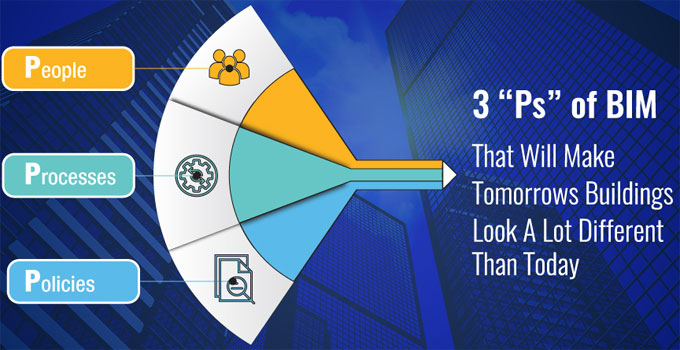To reap the complete
benefits of BIM for next generation of construction, the emphasis should be
given on the 3 ‘Ps’ of BIM i.e. people, process and policies.
People is the first ‘P’ of BIM: To implement BIM in a
positive manner, the organization should need the entire team to realize its
significance and accept it’s adaptability. The people are mostly responsible to
bring in the advancement and so it should be given first priority against the
processes and policies.
It is very crucial to
develop sound relationships with professionals, in-house teams or a design
support solutions provider. It is considered as one of the most vital factors
while commencing technological conversion.
Process is the second ‘P’ of BIM: Sometimes, it is
found that even skilled AEC professionals find it difficult to execute BIM
though they are fully conscious concerning the benefits of the BIM. They mostly
prefer to adopt the shortest and simplest method by employing the new
technology with old processes. They give priority to use the obsolete processes
because they are accustomed and comfortable with them.
As for instance, it is
found that professionals or AEC firms using a building program in Microsoft
Excel on one monitor, and although, they require Autodesk AutoCAD or Revit.
They are engaged in generating and regenerating the data while they can employ
Excel-to-Revit tools and produce spaces from Excel in Revit automatically. Lots
of processes produce a lot of data waste over the lifespan of construction
projects.
The third ‘P’ of BIM is policies: While going to adopt
BIM-friendly processes, company policies are considered as the major barrier to
overcome.
BIM
becomes effective when all the people, who are associated with the construction
project, can distribute information without restrictions as well as
collaborate. Contracts generally prohibit information distribution by adhering
to the clause of confidentiality, liability and litigation concerns. So, it is
vital to understand that design solutions are essential to the protect
companies as well as inspire them to collaborate.
Companies can also
safeguard themselves with the use of filters to the information they
distribute; as for instance, building plans should be marked with green,
yellow, or red, to specify whether the information is final, provisional, or
incomplete. By making collaboration with stakeholders, all parties can mutually
settle definitions, processes, policies, and parameters before the commencement
of any project. This initiative can minimize risk and at the same time
reorganize the workflows that BIM depends upon.
Article Source : www.pbctoday.co.uk
Article Source : www.pbctoday.co.uk

~~~~~~~~~~~~~~~~~~~~~~~~
Published By
Rajib Dey
www.bimoutsourcing.com
~~~~~~~~~~~~~~~~~~~~~~~~
No comments:
Post a Comment